-
Rendez-Vous with French Cinema 2024
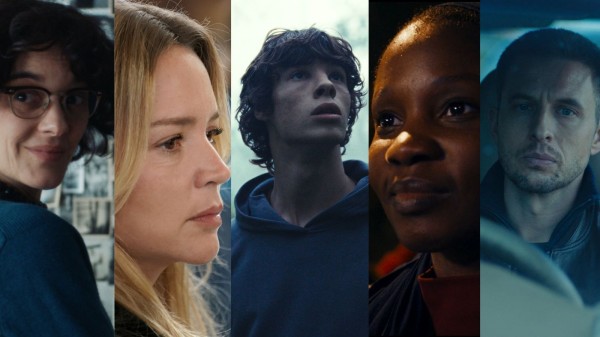
Unifrance and Film at Lincoln Center present
29TH RENDEZ-VOUS WITH FRENCH CINEMA
FILMLEAF GENERAL FILM FORUM THREAD
LINKS TO REVIEWS
ALL TO PLAY FOR /RIEN À PERDRE (Delphone Deloget 2023)
AMA GLORIA (Marie Amachoukeli)
ANIMAL KINGDOM, THE (Thomas Cailley)
AUCTION (Pascal Bonitzer)
BANEL & ADAMA (Ranata-Toulaye Sy)
BOOK OF SOLUTIONS, THE (Michel Gondry)
INDÉSIRABLES, LES (Ladj Ly)
JUST TWO OF US (Valérie Donzelli)
LITTLE GIRL BLUE (Mona Achache)
NO LOVE LOST/LA FILLE DE SON PÈRE (Erwan le Duc 2023)
ON THE ADAMANT (Nicolas Philipbert)
RED ISLAND (Robin Campillo)
SPIRIT OF ECSTASY (Hélena Klotz)
TONI/TONI EN FAMILLE (Nathan Ambrosiani 2023)
February 29- March 10, 2024
Opening Night—New York Premiere of Thomas Cailley's The Animal Kingdom
starring Romain Duris, with Cailley in person
Featuring films starring Marion Cotillard (in person), Melvil Poupaud, Virginie Efira, Noée Abita, Laetitia Casta, Anders Danielsen Lie, Léa Drucker, Romain Duris, Adèle Exarchopoulos, Vincent Lacoste, Françoise Lebrun, Pierre Niney, Nahuel Pérez Biscayart, and Sofiane Zermani
Little Girl Blue (Charades Films); All to Play For (Curiosa Films); The Animal Kingdom (Magnolia Pictures); Les Indésirables (Goodfellas); First Case (Be for Films)
New York, NY (January 25, 2024) – Unifrance and Film at Lincoln Center announce the lineup for the 29th edition of Rendez-Vous with French Cinema. Taking place from February 29 through March 10, this popular annual festival showcases the verve, creativity, and depth of contemporary French cinema in a variety of genres.
The 2024 Opening Night selection is Thomas Cailley’s French box office hit The Animal Kingdom, the director’s long-awaited follow-up to Love at First Fight (a highlight of Rendez-Vous 2015) and most recently nominated for 12 César Awards, including Best Director and Best Film. Cailley, who most recently won Best Director at the 29th Lumière Awards, envisions a mysterious infection that selectively mutates the bodies of ordinary people into animal hybrids at unpredictable speeds in a darkly imaginative exploration of a human ecosystem undergoing inexplicable—but potentially liberating—transformation.
Last edited by Chris Knipp; 02-16-2024 at 05:16 PM.
Reason: E
-
THE ANIMAL KINGDOM/LE REGNE ANIMAL (Thomas Cailley 2023)
THOMAS CAILLEY: THE ANIMAL KINGDOM/LE REGNE ANIMAL (2023)
2024 Rendez-Vous with French Cinema Opening night film, Feb. 29
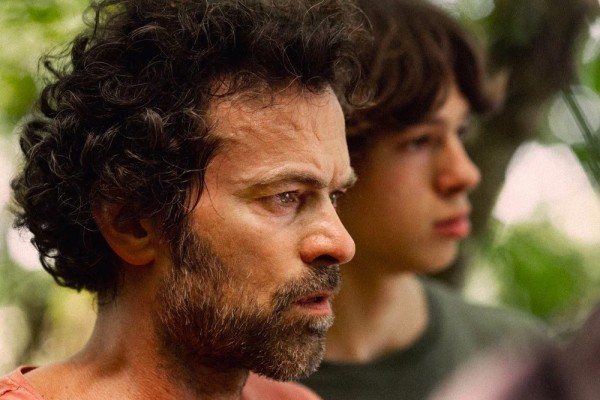
ROMAIN DURIS, PAUL KIRCHER IN LE RÈGNE ANIMAL
A father and son face species alteration
TRAILER
The French have gotten into time travel and other sci fi transformations in TV series; this time Thomas Cailley has done a feature film about a France besieged by a wandering infection that makes humans turn into frightening animal hybrids. The country is ripped apart, and medical science isn't finding solutions fast enough. Our focus is on a father, François Marindaze, and his 16-year-old son Émile.
The film at first might seem like no more than so-so M. Night Shyamalan. But look again. This is a French film, and therein lies the first essential difference. François is played by the popular star Romain Duris (L'Auberge Espagnole, 2002; The Beat My Heart Skipped, 2005) and Émile by impressive newcomer Paul Kircher, the son of Irène Jacob and Jérôme Kircher who starred in Christophe Honoré's recent Le lycéen/Winter Boy, playing an unusually autobiographical version of the writer-filmmker's younger self. In French cinematic terms, this is a heavy duo. They face chaos together, and apart, and it's a vivid, engaging struggle where the human values matter more than special effects, but we are plunged continually into a disorienting world. When you think of it Cailley was already doing this in his first film just by playing with conventions of the masculine and the feminine. This, ten years later, is his stunning sophomore effort.
There may be comments about the special effects - notably of a dramatically species-altered man befriended by Émile called "Fix" who turns into a bird, played by Tom Mercier. The extraordinary part-French, part-Israeli actor Tom Mercier is a special effect in himself, and has been from when he burst on the scene with Nadav Lapid's 2019 Synonymes . Nonetheless the beauty of [IThe ]Animal Kingdom [/I] is how it maintains our credulity and excitement by not showing us much, just with the dismemberment of the back of an ambulance, the too-loud flutter of vast, barely seen wings.
There is the immediate human interest, and then, more distantly, there are the not-so-subtle political implications. The line is drawn pretty much down the middle between the liberals and humanists who want to work out a means of coexistence with the new hybrids whom people unflatteringly refer to as "beasts" or "critters" (bestioles, créatures), and the right wingers, the rednecks and meatheads who just want to go out with rifles and rockets and destroy them wherever they turn up.
Émile's mother has turned into one of them. But she is in medical care and a lot of them are to be transferred to the south (conveniently, where the rednecks live). François is fiercely loyal. He wants to protect her, and when Émile, very slowly, starts to turn, does all he can to protect him too. François, who is a cook, instantly gives up home and job and takes Emile south to be with his wife, Émile's "maman," putting Émile in a new school, where he has (with some difficulty) a girlfriend, and François must take a demotion to waiting table.
The tension of the tale is between how fast things went wrong and keep getting worse for mom (if these transformations are a degeneration and not just a change, which may be kept a little open) and how slowly things diverge for Émile. The tease of that puts most of the focus on the boy - though it's not certain whether the action of this film is simple and colorful enough to make it suitable for a young audience.
The smooth face and bee sting lips of Paul Kircher are never spoiled. His transformation is a nagging source of shame and covering up and a torment for him; but it's more subtle than the cases of his mom and Fix: more a matter of a rougher, higher ridge on his vertebral column, a light frizz of new body hair on his arms, odd excrescences on his fingernails. Something internal may be happening more rapidly, though. Where have you seen a sci-fi movie where you know someone has turned decisively into another, non-human species because he can't sign his name? But that's what happens here, and Cailley's writing is ingenious enough and his direction clear enough so that it works.
We wouldn't have predicted much about Thomas Cailley's new feature from his larky, enjoyable first one, completed a decade ago and widely seen here - ecept for a similar taste for skirting boundaries between ordinary and strange. It was called Les combattants ("Love at First Fight") and featuring Adèle Haenel who was to win international fame and prizes at Cannes with Portrait of a Lady on Fire (2019) from the pen of her girlfriend (as we learned), the excellent Céline Sciamma. There's a strong woman in this one too, an officer of the Gendarmerie Nationale and almost-love interest for François called Julia played by another French star, Adèle Exarchopoulos. If we look at Cailley's 2018 TV series, film,"Ad Vitam," co-written and helmed with Sébastien Mounier, there he entered into the manipulated world of sci-fi we are plunged into with The Animal Kingdom.
The muscular earthiness of Romain Duris and the disarming directness of Paul Kircher - they don't look much alike, but he seems to be taking after his mother - make an engaging, powerful combination anchoring the film as father and son here, kept continually alive by Thomas Cailley's constant, explosive action in this film. Animal Kingdom may seem at times to be teasing and playing with us too much, becoming a little repetitious in its treatments of the various crises, though François' final accepting solution is a satisfying one. But the emotions feel authentic, the action fresh. The film did very well in France and deserves a respectful look from fans of understated sci-fi fantasy everywhere. It takes genre to a level of humanism that is exceptional.
The Animal Kingdom/Le regne animal, 128 mins., debuted at Cannes in Un Certain Regard May 17, 2023. Nominated for 12 César Awards including Best Director and Best Film, AlloCiné press rating 4.3 (86%), spectators 4.0 (80%). (This was perhaps the all-round best received French film in France last year.) It opens in theaters by Magnolia and on demand Mar. 15, 2024. Screened for this review as part of the Rendez-Vous with French Cinema at Lincoln Center, New York (Feb. 29-Mar. 10, 2024. Showtimes (Opening NIght):
Thursday, February 29 at 6:00pm (Introduction with Thomas Cailley)
Thursday, February 29 at 9:00pm
Last edited by Chris Knipp; 02-21-2024 at 09:09 AM.
-
THE TWO OF US/L'AMOUR ET LES FORÊTS (Valérie Donzelli 2023)
VALÉRIE DONZELLI: JUST THE TWO OF US/L'AMOUR ET LES FORÊTS (2023)
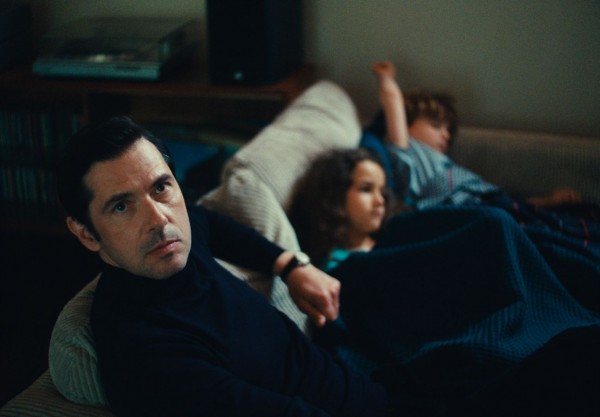
MELVIL POUPAUD IN JUST THE TWO OF US
Husband from hell
Valérie Donzelli takes a new turn from lighter films she has acted in to putting the prolific and often charming Melvil Poupaud with the new "it" girl Virginie Efira in a dark tale of a woman's entrapment in a toxic and abusive marriage. It's an opportunity for both stars to do something new: Poupaud as a nightmarishly controlling and insanely jealous husband and Efira not only as his attractive victim Blanche but as her twin sister Rose who helps her finally escape. It's a tale that might have been interestingly treated by Douglas Sirk, or more colorfully by Brian Di Palma. Or Hitchcock, in a new world more focused on women's rights (seemingly the main guide here) might have turned it into a suspense crime drama. Or, come to think of it, Chabrol woild have had a better solution back in the day: having the wife murder her husband, and their two young children just for spite.
This is a different kind of treatment, a more colorless and neutral one which we can only assume is meant to teach us how bad men can be. (Some of us already knew.) The film is conventionally told as a story in flashback of Blanche (Efira) recounting her marriage for the benefit of her Advocate (Dominique Reymond), the woman attorney who will defend Blanche when she sues Grégoire Lamoureux (Poupaud), her odious husband, for divorce. The Advocate intervenes from time to time in the narrative to urge Blanche just to tell it like it is, and assure her along the way that all she did was justified - or the best she could have done under the circumstances. There is no climax: the movie ends with lawyers and warring spouses finally walking into a courtroom.
Justine Triet's Anatomy of a Fall/Anatomie d'une chute, another 2023 French film and an Oscar nominee for Best Film, is a current example of how wildly entertaining a courtroom drama can be. But The Two of Us/L'Amour et les forêts eschews the courtroom and instead plunges us in the sheer torture of this bad marriage with no satisfying follow-up of justice done.
First there is the meet-cute, which itself eschews originality for a straightforward, no-prelims come-on, where Gregoire practically proposes to Blanche as he introduces himself at a party. One slow dance, some wet kissing, and it's a done deal. Nothing cute or imaginative about this. But he's charming, goodlooking, and works at a bank. She's a lycée French teacher who loves her work. She should have seen through the condescension of the man's too-fast approach and utter lack of imagination. But she gives in. His quotes from literature satisfy her. Later she gets named favorite French teacher by her lycée students, but she hasn't learned much from literature.
The switcheroo comes at 35 minutes when they've married. He abruptly moves them up to the northwest corner of France to Metz, and she learns shortly after from his boss that he was not transferred but asked to be transferred. It's the sticks, and it's far from sister Rose. And he's not too pleased by her finding a new teaching job as a substitute. That's only the beginning. They have two kids right away, a girl and boy. Seven years go by in which Grégoire becomes more and more controlling, imposing a joint account and sharply restricting Blanche's movements. He's horrified when a wise Rose gives Blanche her car so she can have some mobility.
This leads to the big moment of infidelity. Blanche goes to meet a man she has connected with online and has not met before who lives in a forest. This seems implausible. Who would do that? But it's perhaps a sign that at this point she is already suicidally desperate, and if she didn't, Éric Reinhardt's 2014 novel "L'Amour et les Forêts" on which all this is based would not have a title. In the event the man (Philippe Uchan) proves trustworthy and interested and skilled at archery, at which Blanche is an instant success. They also hit it off in bed, he washes her hair - big mistake, because it pokes holes in her alibi to Grégoire. From this one-day affair, Blanche's life becomes a nightmare.
The way in which Grégoire's repeated, torturous interrogations of Blanche are presented in the film is heavy-handed. (I have not read the popular book.) We get it: this man is a shit. So what? It seems uncertain why Poupaud took this role. Perhaps out of boredom? To serve the French branch of #MeToo that Catherine Deneuve joined more than 100 other Frenchwomen in entertainment, publishing and academic fields in signing a letter to denounce? French men, you have been served. But did you deserve this crude portrait?
Also by Donzelli I have reviewed Queen of Hearts (2009) and Declaration of War (2011), in which Donzelli also acts. Here she turns things over to French star of the moment Virginie Efira (who earned my love first in 2016 with the very funny Victoria, with Vincent Lacoste and Melvil Poupaud) and Poupaud again here (a favorite since Rohmer's great Conte d'Eté in 1996). Both have done better.
Speaking of Éric Rohmer, his star Marie Rivière plays the twins' mother, and we also see Virginie Ledoyen and Romaine Bohringer in the film. Would that it had been another film.
Just the Two of Us/L'Amour et les forêts ("Love and the forests"), 105 mins., debuted in the Premiere section at Cannes May 24, 2023 and opened in Paris that day. AlloCiné press rating 3.8 (76%), spectators 3.9 (78%). Screened for this review as part of the Rendez-Vous with French Cinema at Lincoln Center, New York (Feb. 29-Mar. 10, 2024. Showtimes:
Sunday, March 3 at 6:15pm (Q&A with Valérie Donzelli)
Tuesday, March 5 at 9:15pm
Last edited by Chris Knipp; 02-16-2024 at 05:27 PM.
-
ON THE ADAMANT/SUR L'ADAMANT (Nicolas Philipbert 2023)
NICOLAS PHILIBERT: ON THE ADAMANT/SUR L'ADAMANT
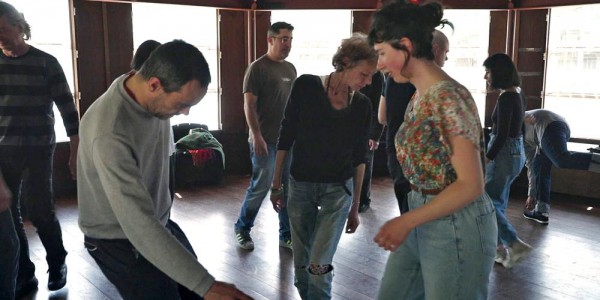
DANCING ON THE ADAMANT
TRAILER
A BARGE FOR SPECIAL PEOPLE
The Adamant is the name of a barge on the banks of the Seine in central Paris that's also a day care facility for neurodivergent adults. That term is used for people on the autism spectrum, but the net is cast wider. Some of the people we hear from in Nicolas Philibert's new documentary speak plainly of long having been mentally ill, and more than one says that without their meds they would not function at all.
So that may be one of the problems of this engaging and loosely slung film (at least one of the people speaks of his connection with the Sixties and Seventies and we hear original musical compositions, one song, and see a lot of painting and drawing being done): we don't know enough about who these people are. What is the "spectrum" of people who spend time here? This is a vagueness that makes the film different from Philibert's wonderful and most famous one, the deeply touching 2002 <A HREF="https://www.chrisknipp.com/writing/viewtopic.php?t=216">To Be and To Have/Être et avoir</a>, about a year at a tiny grade school in in rural Issoire, in the center of France, with a single, loving teacher; or the 2010 Nénette, about a world-weary 40-year-old imprisoned orangutan, first from the visitors' point of view, then from his.
What comes through is Phlibert's special kindness and patience, simply in the way his camera and his microphone listens to the unheard and sees the unseen. The thing that's different about the Adamant, someone says, is that the people come here of their own free will. The visitors have evidently dealt with medical facilities all their lives, institutions. Here they come more for enjoyment and participation a meal, a good cup of coffee, to hang out. As the blurb says, it's "a haven of community and caretaking." There are somewhat mysterious sessions at doing accounts, not much fun, but no doubt useful. There is a film group, which holds discussions. There are the opportunities to play keyboard music or the guitar or to dance. There are the drawing sessions, though one discussion of a painting shows the usual pointless external comments, perhaps from a nurse or other consultant - but no worse than you'd probably get in any art class!
In the middle of a world of mental institutions, Philibert has found a forgiving, even fun place. And he reminds us at the outset and the finale that it's made of shuttered wood, looks rather spiffy, and is on the Seine. This may not be one of the director's best films, but it could be an eye-opener for many, a view of how institutions for the mentally "different" could be softened and warmed.
However casual-seeming,Life on the Adamant nonetheless not without limits. When one 'visitor' who says she has been coming for years makes a lengthy and rambling appeal to be allowed to 'teach' a dance class, a young employee says inmates being given teaching jobs is not a policy of the place.
There is the gentleness, but perhaps not as much intimate attention as To Be and to Have. Philibert's 2013 film about he French government House of Radio similarly was attentive, but somehow failed to pull things together, to orient us. But he's still a great documentary flmmaker.
On the Adamant/Sur l'adamant, 109 mins. debuted at the Berlinale Feb. 24, 2023, where it was awarded the Golden Bear, and opening theatrically in France Apr. 19, 2023, receiving a César nomination and AlloCiné ratings of 4.2 (84% for the press and 3.9 (78%) from spectators. A US Kino Lorber release.
Screened for this review as part of the Rendez-Vous with French Cinema at Lincoln Center, New York (Feb. 29-Mar. 10, 2024. Showtimes:
Monday, March 4 at 6:00pm (Q&A with Nicolas Philibert)
Friday, March 8 at 3:45pm
Last edited by Chris Knipp; 02-16-2024 at 09:46 PM.
-
AUCTION/LE TABLEAU VOLé (Pascal Bonitzer 2023)
PASCAL BONITZER: AUCTION/LE TABLEAU VOLÉ (2023)
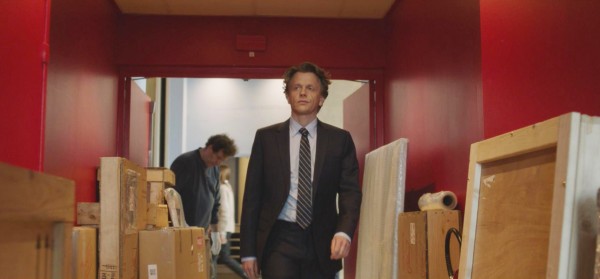
ALEX LUTZ IN PASCAL BONITZER'SAUCTION
Discovery of a long lost Egon Schiele painting leads to excitement
In Auction/Le tableau volé,an appraiser of the French Hôtel Drouot auction house, André Masson (Alex Lutz), gets the information that a factory worker in Mullhouse who lives with his widowed mother has come across what he thinks is a lost painting by Egon Schiele last recorded in 1939, when it was seized from its Jewish collector by Nazi officials.
It's the sharp dialogue and the testy personal relations that keep us watching, though, and make this not only an art thriller but a study in human nature. Masson is at the center, and beside him his odd new assistant Aurore (Louise Chevillotte), who may not have Bruce Chatwin's famous "eye" but is devious, a liar, and has up her sleeve some very ingenious high level techniques of gaming the auction system. One of the concrete "actions" of the early scenes is her finding a handsome, stylish fur and leather short coat for herself for 150 euros on sale in the house. It would be worth more like 20 thousand, but fur is dead on the market, and the dealer who has a bid on it is cheap. Thus the skillful Bonitzer, who wrote for Jacques Rivette and for Cahiers du Cinéma, knows how to weave sophistication and status consciousness into writing about a world that can't be brought to life without them.
Masson reveals to the trainee that despite his glamorous car and box full of luxury watches, he, like her, like the new possessor of the Egon Schiele, comes from the sticks.
Masson has a cordial relationship with his ex-wife (Léa Drucker), who's been ex- for a decade. Something makes Masson and his ex-wife think this supposed Egon Schiele is worth a trip to Mulhouse, and since he still loves collectible cars, she suspects he'll enjoy the quite marvelous museum of those there, of which we get a tempting glimpse.
When they see the painting, they immediately know it's authentic. This moment vies with the moment of the auction sale for focusing the greatest excitement that the search for lost art treasures can bring.
A cornerstone of the tale is the boyish, sensitive young factory worker (Arcadi Radeff), who is thirty going on nineteen. The discovery of the painting brings about immediate trouble with his potes, his buddies, with one of whom he gets into an intense physical struggle after the other guy wants to turn over the painting and see the back. A charm of the latter part of the film is seeing the young man, who has refused to put on a tie for the auction house people's visit, go with his provincial lawyer representative (Nora Hamzawi), and be put up by Hôtel Drouot at a large, posh hotel with a view almost on top of the Eiffel Tower, to attend the auction dressed in a well cut suit. He disappears for a while thereafter, wandering off, and is found hunched on the paving, crying. Later, members of the Jewish family of the original owners gather and applaud the boy and shake his hand. Rich now, he buys his mother a new house but returns to his factory job and his potes.
But before this can happen there is an obstacle to the brisk 25 million euro auction sale: the wealthy representative of the now American Jewish family of the original collector is manipulated by his French lawyer into vastly underestimating the value of the painting and deciding on selling it for cheap. He has to be skillfully blocked from doing this. This is where Masson's dicey assistant Aurore comes in, with an ingenious ploy to save the painting for auction and bring it in closer to its real value.
It's all wonderfully tricky and fascinating, and a Variety preview explains Bonitzer had originally envisioned this as a TV series: there's so much material one can see why. On the other hand, this makes an unusually layered feature, and I'm looking forward to seeing it again. The relationship between Masson and Aurore prickles and sparkles throughout the film. Before she comes to a drunk and hopeless Masson, five "single malts" to the wind, gives him a script to address the American Jewish collector representative and change his mind about a cheap sale, she has already become so angry and insulted by Masson she has quit and walked out. But a lost Egon Schiele is the kind of thing that makes personal issues dwindle.
A bit of conventionality in the writing comes with the usual overhead plotting. Right after the auction conducted by Masson in which the painting has sold for 25 million euros (possibly too little, given that Klimt's The Kiss went for 135 mil) Masson's boss (Francis Vierville) has edged out the company's chairman and now puts him in his place, thus shuffling Masson to a desk job away from the excitement and suggesting he too may be soon offed, so he decides to go out on his own.
I'm not sure all the details make sense, or that I understand fully how profits of the auction are divided up. I've mentioned the likelihood that the auction sale price is too low. It also seems, though it's not clear perhaps, that the sale has been scheduled too soon. Masson has mentioned the need to prime the market early on.
In the end none of these questions detract from what a very sharp, exciting, and entertaining film this is.
Auction/Le tableau volé, ]91 mins., has its French release May 1, 2024. No other information. Screened for this review as part of the Rendez-Vous with French Cinema at Lincoln Center, New York (Feb. 29-Mar. 10, 2024. Showtimes:
Friday, March 1 at 9:00pm (Q&A with Pascal Bonitzer)
Sunday, March 10 at 6:30p
Last edited by Chris Knipp; 02-23-2024 at 11:58 AM.
-
THE BOOK OF SOLUTIONS/LE LIBRE DE SOLUTIONS (Michel Gondry 2023)
MICHEL GONDRY; THE BOOK OF SOLUTIONS/LE LIVRE DE SOLUTIONS (2023)
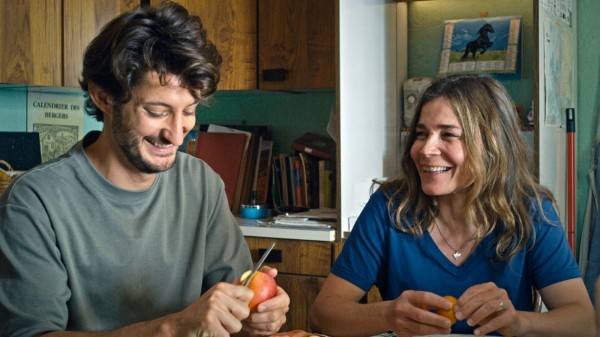
PIERRE NINEY, BLANCHE GARDIN IN LE LIBRE DE COLUTIONS
A talented young French filmmakers goes off his meds
Michel Gondry is a talented and original French filmmaker who has seemed to wander off the rails more than once. Many think his sophomore effort, the collaboration with Charlie Kaufmann Eternal Sunshine of the Spotless Mind was his high point as a director, not equalled despite seven films since. This new work, an examination of a young filmmaker, played by PIerre Niney, going off the rails, chronicles an emergency reedit done at the director's aunt's house in the country. The production company meeting in Paris has decided the movie is taking too long and going badly and takes it away from Gondry - er, Marc Becker (Niney). Becker calls his faithful staff and activates "Plan B." They seize the film and cart it to the aunt's house. The film is shot from here in a house belonging to Gondry's own late aunt Suzanne (profiled in his 2009 documentary The Thorn in the Heart, R-V 2010).
This revolt inspires Marc to throw away his daily meds. He essentially goes manic, entering into one wild scheme after another, forgetting ever to look at the actual film he's working on. He shows it, what there is of it, to the assembled town, but during this event he photographs the villagers - mostly sleeping - and forgets to review the film.
We must remember that this is a comedy, and some do find it funny, though neither the French press ratings nor the spectators' reflects wild enthusiasm (see below).
We might as well also note that when Owen Gleiberman reviewed the film for Variety at Venice where it debuted, the headline was "'The Book of Solutions' Review: When Did the Talented Michel Gondry Become the World’s Most Annoying Filmmaker?" This is unusually negative for a Variety review, and not typical of the general French response reflected on the website AlloCiné. On the contrary, they generally saw The Book of Solutions as a success.
What Gondry is doing here, apparently referring somewhat to what happened with him during the making of his Boris Vian adaptation Mood Indigo (Rendez-Vous 2014) - which might help explain its impenetrable denseness of invention - is letting his fondness for artisanal, unconventional, off-the-grid filmmaking show to the max. Some of that came out more sweetly and playfully in his last film (2015), the boyhood adventure tale Microbe & Gasoline, where two kids build an improvised "car" to travel across the country during their summer holidays. But in The Book of Solutions Gondry doesn't quite come to terms with the mental derangement aspect - or that the repetitive whimsy of Becker's often nutty inventions may pall after a while.
A colleague expert in the history of advertising tells me about the pioneering role Gondry played in the use of CGI in film adverts and music videos. (Others have made this leap, including Spike Jonze and David Fincher.) Sometimes artists have trouble making transitions from short to longer forms. But The Book of Solutions may rather stand as some kind of ultimate statement about a filmmaker off the rails and off his meds going wild with bricolage in the provinces.
Here one can appreciate the unique Françoise Lebrun as aunt Denise, as well as Blanche Gardin as a loyal editor.
See Filmleaf September 2023 Venice note.
Also released at Venice Sept. 4 was François Nemeta's 80-min. documentary about the filmmaker, Michel Gondry, Do It Yourself! (IMDb).
The Book of Solutions/Le Livre de solutions, 103 mins., debuted at Camnes Directors Fortnight May 23, 2023. Limited French release Jun. 7. AlloCiné Press rating: 3.8 (76%) spectators 3.0 (60%).
Screened for this review as part of the Rendez-Vous with French Cinema at Lincoln Center, New York (Feb. 29-Mar. 10, 2024. Showtimes:
Thursday, March 7 at 6:00pm
Sunday, March 10 at 4:00pmr)
Sunday, March 10 at 6:30pm
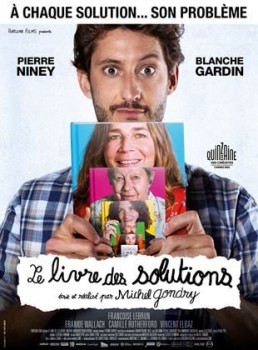
Last edited by Chris Knipp; 02-23-2024 at 10:42 AM.
 Posting Permissions
Posting Permissions
- You may not post new threads
- You may not post replies
- You may not post attachments
- You may not edit your posts
-
Forum Rules





 Reply With Quote
Reply With Quote






Bookmarks